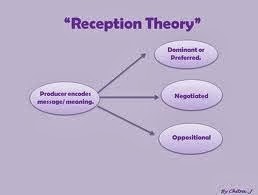There are three types of reception models:
Dominant - The reader fully shares the text's code and accept and reproduces the preferred reading.
Negotiated - The reader partially shares the text's code and broadly accepts the preferred reading, but sometimes resists and modifies it in a way which reflects their own position, experiences and interests.
Oppositional - The reader, whose social situation places them in a directly oppositional relation to the dominant code, understands the preferred reading but does not share the text's code and rejects this reading.
An example of this could be "The Funeral" by Band of Horses where audiences could initially see the song as being about the loss of someone close to one of the band members. The actual meaning of the song is about the children that the lead singer has lost due to his partner having miscarriages. However, people could take the message of this song and apply it to their own situation where the meaning would change based around their lives and experiences, showing how audiences can interpret media and create their own meanings.

No comments:
Post a Comment